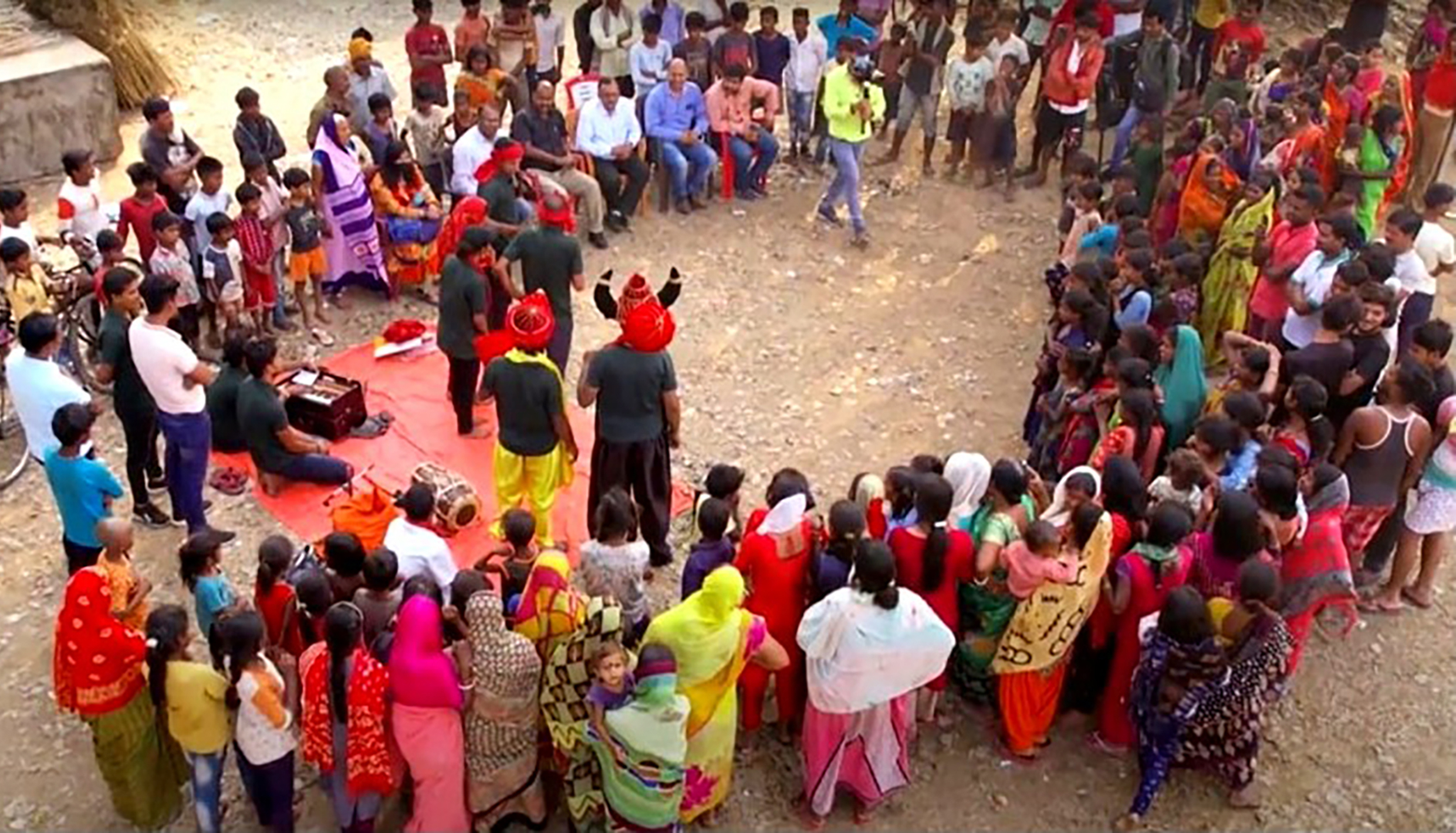NUKKAD NATAK: Dispelling myths to encourage vaccination uptake in vulnerable communities

SITUATIONAL INSIGHTS
The measles outbreak in December 2022 reflected lower immunization coverage. Deep diving into the reasons, it was concluded that vulnerable population of the Mahadalit tola was grappled with several myths and misconceptions. They believed that measles is not a disease rather a manifestation (Maataji). Since the cases escalated further in January and February, it was apparent that the situation needed swift and adaptive methods to control its spread. As a part of the outbreak response measure, efforts were taken to identify active cases and also strengthen the passive surveillance. A mega information, education, and communication (IEC) drive was carried out in all the blocks of Bhojpur to create awareness and dispel myths around vaccination.
The vulnerable populations of Mahadalit tolas are the most disadvantaged section of our society since they are socially excluded, poor and lack public amenities. These marginalized communities live in hamlets outside the main village with very little or no public amenities. Low immunization led the Mahadalit children of Bhojpur to fall prey to serious measles outbreak in January and February 2023. It was clear that the situation required swift and adaptive methods to control measles from spreading further. The state and district teams visited the respective blocks to assess the situation and diagnose the reasons behind the outbreak.


Extreme poverty and illiteracy in the community, compels them to live in an unhygienic environment, at-risk of several diseases and malnutrition. Further various myths and mistrust on government systems make the Mahadalit communities the area where routine immunization rates are low while refusals and hesitancies are exceptionally high. Moreover, the residents of Mahadalit tolas believed that the vaccine was not good for their children and might be a threat to their lives. The affected kids were not isolated which led to spread of the infection. The hesitancy and unvaccinated children have caused the outbreak to spread quickly.
The State Health Society Bihar planned for a mega drive to disseminate information, education, and communication (IEC) in all the blocks of Bhojpur to create awareness about the importance of vaccination.
House-to-house survey was conducted to collect the required information related to vaccination and to understand the problems that exist in communities. After the assessment, it was decided that to address these myths and misconceptions, an awareness drive must be taken. Therefore, the most engaging platform, a Nukkad Natak titled- ‘Teekave Upaye Ba’ in Bhojpuri was acted out in the Mahadalit tolas. Altogether 211 nukkad natak were conducted.
On the day of the Nukkad Natak, a team of supervisors from PHC (MOIC, BHM, BCM) and development partners like PCI, UNICEF and WHO conducted supportive supervision and shared their feedback to the MOIC and DIO. Since the myths were addressed through the IEC drive, there was a shift in the thought process which eventually led people to get their children vaccinated. Altogether, 218 special session sites were organized between 18th March – 8th April 23 as per the due list and a total of 776 session sites were organized in the past three months (March, April and May).
Session sites ensure the effective management of immunization programme in the respective catchment area. On the date of the session the ANM and ASHA didi ensure their presence. Special session site is referred to the additional sites in Mahadalit tolas as required. Under the chairmanship of BDO, MOIC, CDPO, JEEViKA BPM the meeting on immunization was held and a detailed micro plan was prepared for vaccination and Nukkad supervision plan. The evening debriefing at BDO office was a key strategy to discuss feedback and for corrective measures.
The team of PCI collaborated with the health department since the outbreak. A meeting was held to prepare a micro plan with the District Immunization Officer, 14 block coordinators and district coordinators who would review the status of measles and the ongoing routine immunization.
The Nukkad Nataks help identify the obstacles that came during immunization. It helped the parents to gain confidence on the vaccine. Several parents in the Mahadalit tolas lacked knowledge about childhood vaccinations and were grappling with unreasonable fears about vaccine safety. The rapid spread of measles amongst children was due to myths, lack of awareness about the precautions and ignorance of session sites. The myths were addressed in the community, and they understood the importance of vaccination which eventually improved the coverage. With the effective strategies of the health department, the barriers to immunization were addressed.
Author: Swati Savarn (Consultant)
Editor: Ronnie Clive Francis (Manager Comms KM)
